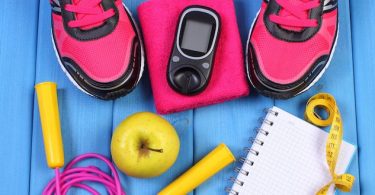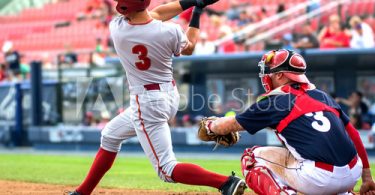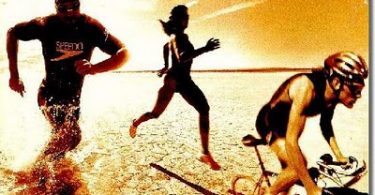Stay hydrated while enjoying every drop of these healthy sizzling summer beverages.
Sports Nutrition Can Give Kids The Competitive Edge

Man on a bicycle, made from vegetables.
Almost thirty million children participate in some form of a team sport. As an athlete, parent or coach, it is necessary to know how to about sports nutrition to support peak sports performance.
A well-rounded sports nutrition strategy should help replace lost electrolytes. It will also support bone growth, the immune system strong, minimize muscle wear and tear while maximizing strength and flexibility.
Is Sports Nutrition Important For Children?
According to A. Collins et al., athlete or not, kids are not eating right. “Nutritional intake may jeopardize optimal athletic performance and place children at risk for future chronic diseases, including osteoporosis.”
Sports nutrition not only helps with improving sports performance. It can help to improve academics and friendships. Family time centered around eating and playing together is good for everyone!
What Are The 5 Critical Elements Provided With Sports Nutrition?
There is no magic bullet when it comes to giving your child the competitive edge. However, sports nutrition and a healthy lifestyle can help make the difference.
- Drink water before, during and after workouts. Adequate hydration is a number one concern:
-
- 20 oz. water 2.5 hours before exercise, 10 oz. 15 minutes before exercise, 8 oz. for every 15 minutes of physical activity and continue drinking electrolyte water (not Gatorade or sugary sports drinks) throughout the course of the day.
-
- Electrolytes (sodium/salt, magnesium, calcium, potassium, and phosphorous) are lost through sweat and should be replaced. Avoid beverages containing sugar (like Gatorade) and caffeine that can cause dehydration.
- You can simply add Himalayan sea salt, as it is full of hydrating minerals.
- Micronutrients help support movement, speed, flexibility, and growth. The Linus Pauling Institute lists important general micronutrient requirements for children, http://lpi.oregonstate.edu/mic/life-stages/children. Specific micronutrients are:
- Iron
- B vitamins
- Vitamin C
- Zinc
- Copper
- Selenium
- Protein should be consumed when hungry. Use a variety of proteins with the goal of eating 1 gram of protein/pound of body weight each day. This total can be split into meals and small snacks (throughout the day and before and after practice) to refuel. Protein serves to:
- repair muscle tissue after workouts.
- provides better absorption of micronutrients that support better performance.
- Rest, relaxation and sleep are critical elements to rejuvenate the muscles and hormones that need to work at peak performance during games and major events.
- Spending time in a warm bath, creating time to read in bed at the end of the day, ensure sleep duration matches age-appropriate recommendations are just a few things that support work-out recovery.
Key Micronutrients, Electrolytes, and Antioxidants for Active Kids |
|
Vitamins, Minerals, and Antioxidants |
|
| Iron | Iron carries oxygen to the cells for energy. The best-absorbed form is red meat |
| B Vitamins | B vitamins, create energy and are essential for growth and development, are involved in healthy looking skin and forming red blood cells |
| Vitamin C | Vitamin C is an antioxidant that helps prevent oxidation, it supports iron absorption too |
| Zinc | Zinc contributes to growth, strong immune system, and healthy skin, hair, nails, and eyes |
| Copper | Copper helps in blood formation and supports the absorption of iron too |
| Selenium | Selenium, like vitamin C, protects against oxidation caused by high-intensity exercise |
Electrolyte balance depends on 3 minerals |
|
| Sodium | Sodium (fluid and electrolyte balance, supports muscle contraction and nerve impulse ) |
| Potassium | Potassium (maintains fluid and electrolyte balance, cell integrity, muscle contractions, and nerve impulse transmission) |
| Chloride | Chloride (fluid and electrolyte balance, aids in digestion) |
Bone strength and growth depends on (calcium, magnesium, and phosphorus) |
|
| Calcium | Calcium helps form bones and teeth |
| Magnesium | Magnesium contributes to bone mineralization, protein building, muscular contraction and nerve impulse transmission |
| Phosphorus | Phosphorus works to form cells, bones, and teeth, maintains acid-base balance |
Learn more about Healthy Foods here.
Sports Nutrition Wrap up
Sports nutrition is critical for any athlete. It will help with muscle recovery, peak performance and can help prevent injury.
Small changes in eating and drinking can make a big difference for EVERY child but especially for those who are active. Next week I’ll explore supplements and post some healthy nutrient dense sports nutrition menus.
Related Articles
Manage Exercise and Blood Sugar
Exercise can raise or lower blood sugar. Use exercise as a way to feel good, manage blood sugar, improve sleep and moods.
A Healthy Nutrition Guide For Kids & Sports
Last week we spoke about why sports nutrition is important for kids. I discussed the nutritional basics on how to gain a competitive advantage by fueling your kids with nutrient-dense foods. Now let’s dig...
Take Sports Performance To The Next Level: Ø Carb Loading
Why Bonk?
Supplement Safety (Part 2 of 2)
Buy brand specific pharmaceutical grade supplements or companies that follow USP or GMP standards. These brands ensure continuity between what is stated on the label and what is contained within the supplement.
Diet and Exercise Combo: A "Real Deal" Breaker
A high protein diet containing 3.4 g of protein for every 2.2 pounds of body weight combined with heavy resistance training can promote weight loss and gains in lean body mass. gains.
Kids: Fuel The Competitive Edge
Are you an athlete and want a competitive edge? Individual nutrition care plans with broad spectrum nutrients will get you there.
Fuel Active Kids With Nutrition Not Just Food
Being able to fuel activity is dependent on energizing the body. Calories are just the packaging its what's inside that counts as real value for a sports advantage.
Think Before You Drink: Alcohol Messes with Muscle & More
Working out hard may be hardly working for you if you drink too much. Excess alcohol affects weight loss, muscle, and sports performance.
Take Performance To The Next Level: Ø Carb Loading
Why build up glycogen stores just to deplete them, hit the wall or "bonk" and go through all that mental and physical trauma? Why? It just does not make sense.







